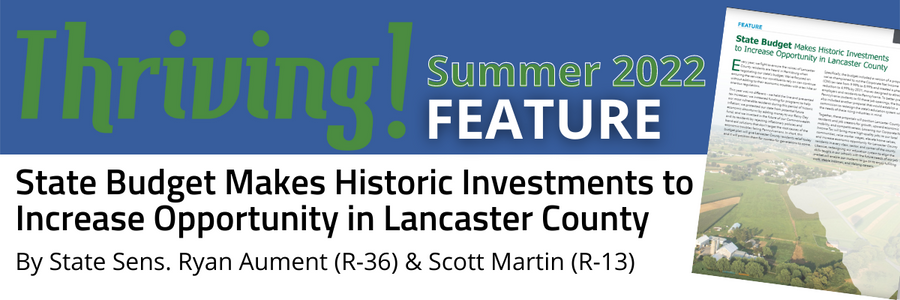By State Sens. Ryan Aument (R-36) & Scott Martin (R-13)
Every year, we fight to ensure the voices of Lancaster County residents are heard in Harrisburg when negotiating our state’s budget. We’ve focused on ensuring the services our constituents rely on can continue without adding to their economic troubles with a tax hike or onerous regulations.
This year was no different – we held the line and prevented tax increases; we increased funding for programs to help our most vulnerable residents during this period of historic inflation; we protected our state from potential future economic downturns by adding money to our Rainy Day fund; and we invested in the future of our Commonwealth and its residents by rejecting inflationary policies and band-aid solutions that don’t target the root causes of the economic troubles facing Pennsylvanians. In short, this budget plan will give Lancaster County residents relief today and it will position them for success for generations to come.
Specifically, the budget included a version of a proposal we’ve championed to cut the Corporate Net Income (CNI) tax rate from 9.99% to 8.99% and created a phased reduction to 4.99% by 2031, moves designed to attract employers and residents to Pennsylvania. To better prepare Pennsylvania students to fill these job openings, the budget also included another proposal that would establish a commission to redesign the state’s education system with the needs of these rising industries in mind.
Together, these proposals will position Lancaster County residents and job creators for growth, upward economic mobility, and competitiveness. Lowering our Corporate Net Income Tax will bring more high-quality jobs to our local communities, raise worker wages, elevate home values, and increase economic opportunity for Lancaster County residents in every class, sector, and corner of the county. Likewise, redesigning our education system to align the skills taught in our schools with the future needs of our job market will enable our students to go on to enjoy fulfilling work, stable incomes, and lifelong careers.
The budget also included historic investments in Pennsylvania’s students that will particularly benefit Lancaster County public schools and prioritize student safety, resiliency, and educational achievement after years of pandemic-induced learning loss. The Education Improvement Tax Credit (EITC) and Opportunity Scholarship Tax Credit (OSTC) programs also received increased funding by an unprecedented $125 million to ensure more students can learn in the educational environment that best suits their individual needs.
Students of charter and cyber charter schools are now allowed to enroll in concurrent college courses through an institution of higher education, and the missions of both Millersville University and Thaddeus Stevens College have been strengthened as a result of the investments made in this budget.
Finally, we also fought to establish a landmark Clean Streams fund which dedicates $220 million to clean up rivers and streams damaged by decades of pollution. The fund will support a new statewide Agricultural Conservation Assistance Program that will greatly assist our farmers.
Overall, this budget makes wise investments in the future of Pennsylvania’s economy, education system, and environment that will allow Lancaster County residents to experience earned success and upward mobility.

This article was first printed in our August Summer 2022 Edition of Thriving Magazine, you can read more here in our digital issue: Thriving Summer 2022
not secure

